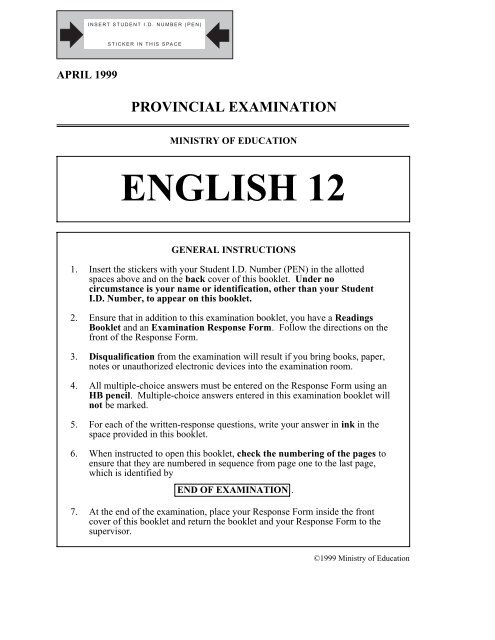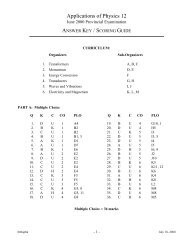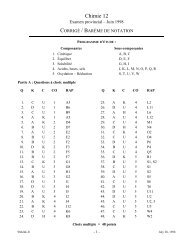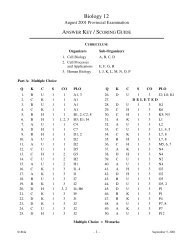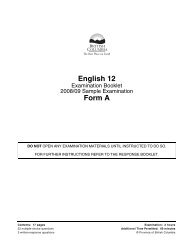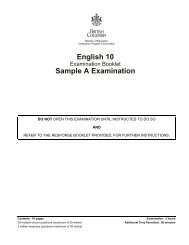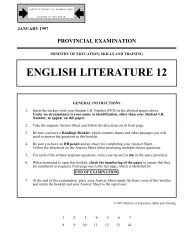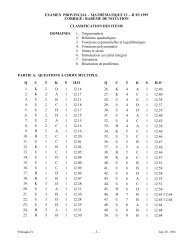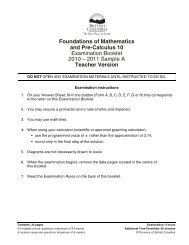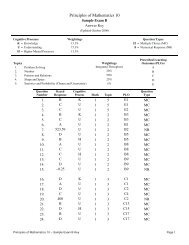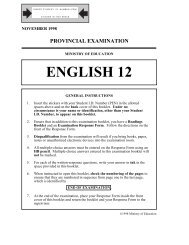english 12 readings booklet - QuestionBank.CA
english 12 readings booklet - QuestionBank.CA
english 12 readings booklet - QuestionBank.CA
- No tags were found...
You also want an ePaper? Increase the reach of your titles
YUMPU automatically turns print PDFs into web optimized ePapers that Google loves.
INSERT STUDENT I.D. NUMBER (PEN)STICKER IN THIS SPACEAPRIL 1999PROVINCIAL EXAMINATIONMINISTRY OF EDU<strong>CA</strong>TIONENGLISH <strong>12</strong>GENERAL INSTRUCTIONS1. Insert the stickers with your Student I.D. Number (PEN) in the allottedspaces above and on the back cover of this <strong>booklet</strong>. Under nocircumstance is your name or identification, other than your StudentI.D. Number, to appear on this <strong>booklet</strong>.2. Ensure that in addition to this examination <strong>booklet</strong>, you have a ReadingsBooklet and an Examination Response Form. Follow the directions on thefront of the Response Form.3. Disqualification from the examination will result if you bring books, paper,notes or unauthorized electronic devices into the examination room.4. All multiple-choice answers must be entered on the Response Form using anHB pencil. Multiple-choice answers entered in this examination <strong>booklet</strong> willnot be marked.5. For each of the written-response questions, write your answer in ink in thespace provided in this <strong>booklet</strong>.6. When instructed to open this <strong>booklet</strong>, check the numbering of the pages toensure that they are numbered in sequence from page one to the last page,which is identified byEND OF EXAMINATION .7. At the end of the examination, place your Response Form inside the frontcover of this <strong>booklet</strong> and return the <strong>booklet</strong> and your Response Form to thesupervisor.©1999 Ministry of Education
ENGLISH <strong>12</strong> PROVINCIAL EXAMINATIONValueSuggestedTime1. This examination consists of five parts:PART A: Editing Skills 10 10PART B: Reading Comprehension 21 35PART C: Poetry 20 30PART D: Prose 25 50PART E: Composition 24 55Total: 100 marks 180 minutes2. Electronic devices, including dictionaries and pagers, are not permitted in the examinationroom.3. The Readings Booklet contains the prose and poetry passages you will need to answer certainquestions on this examination.4. The time allotted for this examination is three hours. Use your time wisely. Adequate writingspace has been provided for average-sized writing. Do not attempt to determine the length ofyour answers by the amount of writing space available.- 1 -OVER
PART A: EDITING SKILLSTotal Value: 10 marksSuggested Time: 10 minutesINSTRUCTIONS:The following passage has been divided into numbered sentences which maycontain problems in grammar, usage, word choice, spelling, or punctuation. One ormore sentences may be correct. No sentence contains more than one error.If you find an error, select the underlined part that must be changed in order to makethe sentence correct and record your choice on the Response Form provided. Usingan HB pencil, completely fill in the circle that corresponds to your answer. If thereis no error, completely fill in circle D (no error).ENCOUNTER WITH DRAGONS1. When we were in Indonesia recently, my wife and me had a chance to see the(A)(B)famous Komodo dragons.(C)(D) no error2. These astonishing creatures inhabit the island of Komodo. Which is a small(A)(B)island near the tropical paradise of Bali in Indonesia.(C)(D) no error3. They are not actually dragons of the fire-breathing variety, but are the largest(A)Monitor lizards in the world, their name is a result of their primitive appearance.(B)(C)(D) no error4. “Even if they don’t breathe fire, they are very impressive lizards!” exclaimed Pat(A)Kelly, our tour director aboard The Bali Sea Dancer, in his briefing prior to us(B)(C)disembarking for the island.(D) no error- 2 -
5. He also informed us that they grow as long as three metres in length, weigh as(A)much as 150 kilograms, and ate as much as 90% of their body weight at a single(B)meal, usually selecting deer, wild pigs, or water buffalo.(C)(D) no error6. Because dragons have very potent bacteria in their mouths, they need only inflict(A)(B)a wound with their razor-sharp teeth and wait for their victim’s to die of infection, a(C)process that takes about three days.(D) no error7. From a distance of up to eleven kilometres, they can track their pray using(A)a very keen sensor in their forked tongues; the dragons then(B)dislocate their jaws to gulp down their catch.(C)(D) no error8. Armed with this information, we were somewhat nervous when the ship’s dinghy(A)dropped us on the beach, however, we were determined to see these strange and(B)primitive beasts for ourselves.(C)(D) no error9. A park ranger, armed only with a forked stick, led us three kilometres along a path(A)(B)through the eerily silent jungle to a compound.(C)(D) no error10. To our dismay, we discovered that the compound was to enclose the tourists not(A)(B)the dragons, which were wandering around freely nearby and watching us(C)with enough interest to make us more than a little uncomfortable.- 3 -(D) no errorOVER
PART B: READING COMPREHENSIONTotal Value: 21 marksSuggested Time: 35 minutesINSTRUCTIONS:Read “One Magical Bloom” on pages 1 and 2 in the Readings Booklet. Select thebest answer for each question and record your choice on the Response Formprovided.11. The narrator stopped telling people that her clematis had bloomed because theyA. did not believe her.B. made fun of her clematis.C. told her about their gardens.D. did not share her enthusiasm.<strong>12</strong>. In paragraph 3, the blooming of the clematis was “magical” because theA. slugs had eaten it.B. cat had damaged it.C. narrator had neglected it.D. narrator’s spouse had cut its roots off.13. In paragraph 3, the word “slugfest” is an example ofA. pun.B. euphemism.C. onomatopoeia.D. understatement.14. In paragraph 3, the word “disdainful” meansA. hungry.B. vicious.C. scornful.D. indifferent.15. For many years, theA. clematis grew but did not bloom.B. narrator forgot about the clematis.C. garden became filled with clematis plants.D. other garden plants choked out the clematis.- 4 -
16. The reason the narrator liked gardening was because itA. reminded her of Ontario.B. gave her a chance to get some fresh air.C. was a spiritual connection to her parents.D. provided her family with fresh vegetables.17. According to paragraph 8, her mother’s garden was important to the narrator when she wasgrowing up because it providedA. a sense of “home”.B. a link to her mother.C. flowers to brighten the home.D. a contact with the natural world.18. The plant that flowered in winter was theA. salvia.B. pansy.C. marigold.D. amaryllis.19. In paragraph 13, the narrator suggests that her grandmother died because sheA. lost her determination.B. became dependent on others.C. could not endure the cold winters.D. could not live without her husband.20. The narrator and her husband namedA. the rose after the grandmother.B. their daughter after the clematis.C. the clematis after the grandfather.D. their daughter after the grandmother.21. The clematis first bloomed on the dayA. the grandfather died.B. the grandmother died.C. the daughter was born.D. of the daughter’s first birthday.- 5 -OVER
One Magical Bloom(pages 1 and 2 in the Readings Booklet)INSTRUCTIONS:Use the space provided in this <strong>booklet</strong> for written-response questions. Write youranswers in ink. You may quote or paraphrase. Complete sentences are notrequired in this section.1. Give three reasons why the narrator’s grandfather was admired.a)(1 mark)b)(1 mark)c)(1 mark)2. Identify two stylistic devices and give an example for each device from the passage thatclassifies this piece as a personal essay.a) Device: (1 mark)Example:(1 mark)b) Device: (1 mark)Example:(1 mark)- 6 -
3. Give three reasons why the narrator now feels that she can plant a rose.a)(1 mark)b)(1 mark)c)(1 mark)- 7 -OVER
Total Value: 20 marksPART C: POETRYSuggested Time: 30 minutesINSTRUCTIONS:Read the poem “Home for the Aged” on page 3 in the Readings Booklet. Select thebest answer for each question and record your choice on the Response Formprovided.22. In line 3, the word “muted” meansA. loud.B. quiet.C. short.D. harsh.23. In line 4, the phrase “Their thoughts are leaves” contains an example ofA. simile.B. metaphor.C. metonymy.D. personification.24. In line 6, the words “decorously shabby” contain an example ofA. hyperbole.B. oxymoron.C. synecdoche.D. understatement.25. Line 8, “The loitering lovers, the boys on bikes, the cars” contains an example ofA. alliteration.B. dissonance.C. apostrophe.D. internal rhyme.26. In line 11, the word “discreet” suggestsA. reckless.B. cautious.C. secretive.D. belligerent.- 8 -
27. The ending of the poem isA. bitter.B. optimistic.C. pessimistic.D. indeterminate.28. Line 14, “In faded headlines on their dusty brains?” suggests that the old menA. have some memory loss.B. suffer vision impairment.C. no longer read the papers.D. have problems with personal care.29. The poem is an example ofA. a sonnet.B. free verse.C. a narrative.D. blank verse.- 9 -OVER
Home for the Aged(page 3 in the Readings Booklet)INSTRUCTIONS:In paragraph form, answer questions 4 and 5 in the space provided. Write in ink.The mark for your answer will be based on the appropriateness of the example(s)you use as well as the adequacy of your explanation and the quality of your writtenexpression.4. In paragraph form and with reference to the first two stanzas of the poem, discuss the poet’s useof descriptive detail to establish atmosphere.(6 marks)- 10 -
5. In paragraph form and with reference to the questions posed in stanza 3 (lines 10–17), explainwhat the speaker is suggesting about the memories of the elderly and what their future holds.(6 marks)- 11 -OVER
Total Value: 25 marksPART D: PROSESuggested Time: 50 minutesINSTRUCTIONS:Read the story entitled “By the River” on pages 4 to 8 in the Readings Booklet.Select the best answer for each question and record your choice on the ResponseForm provided.30. One reason why Jim may have laughed at the movie characters is because heA. is insecure.B. is conceited.C. thinks they are humorous.D. does not understand them.31. In paragraph 9, the word “engulfed” meansA. scared.B. blocked.C. shadowed.D. surrounded.32. The tone of paragraph 19 isA. angry.B. ominous.C. romantic.D. humorous.33. Paragraph 44 suggests that the conductor’s attitude to Crystal isA. hopeful.B. scornful.C. annoyed.D. sympathetic.34. This story takes place inA. late spring.B. early spring.C. late summer.D. early summer.- <strong>12</strong> -
35. By the end of the story, the author suggests thatA. Jim will not return.B. the train will not return.C. Crystal will not survive.D. Crystal’s clothes are tattered and old.36. The point of view of this story isA. objective.B. first person.C. omniscient.D. limited omniscient.- 13 -OVER
By the River(pages 4 to 8 in the Readings Booklet)INSTRUCTIONS:In paragraph form, answer questions 6 to 8 in the space provided. Write in ink.The mark for your answer will be based on the appropriateness of the example(s)you use as well as the adequacy of your explanation and the quality of your writtenexpression.6. In paragraph form and with reference to the story, discuss the role of flashback. (6 marks)- 14 -
7. In paragraph form, state a main theme and support your theme statement with reference tothe story.(6 marks)- 15 -OVER
8. In paragraph form and with reference to the story, discuss the contrasts between Crystal andJim Styan.(6 marks)- 16 -
Value: 24 marksPART E: COMPOSITIONSuggested Time: 55 minutesINSTRUCTIONS:Using standard English, write a coherent, unified, multi-paragraph composition of300-500 words on the topic below. In your composition, you may apply anyeffective and appropriate method of development which includes any combinationof exposition, persuasion, description, and narration.Use the page headed Organization and Planning for your rough work. Write yourcomposition in ink on the pages headed Finished Work.9. Write a multi-paragraph composition on the topic below. Your response may draw upon anyaspect of your life: your reading, your own experiences, the experiences of others, and so on.Topic: Recognizing Truth- 17 -OVER
Organization and Planning- 18 -
FINISHED WORKTopic: Recognizing Truth- 19 -OVER
FINISHED WORK- 20 -
FINISHED WORK- 21 -OVER
FINISHED WORKEND OF EXAMINATION1stSUBTOTAL2nd- 22 -
||||||||||||||||||||||||||||||||||||||||||||||||||||||||||||
INSERT STUDENT I.D. NUMBER (PEN)STICKER IN THIS SPACEENGLISH <strong>12</strong>April 1999Course Code = EN
FOR OFFICE USE ONLYENGLISH <strong>12</strong>April 1999Course Code = ENScore forQuestion 1:1. _____(3)Score forQuestion 2:2. _____(4)Score forQuestion 3:3. _____(3)Score forQuestion 8:8. _____(6)Score forQuestion 9:9. _____(24)Score forQuestion 4:4. _____(6)Score forQuestion 5:5. _____(6)Score forQuestion 6:6. _____(6)Score forQuestion 7:7. _____(6)
ENGLISH <strong>12</strong>READINGS BOOKLETAPRIL 1999©1999 Ministry of Education
THIS PAGE INTENTIONALLY BLANK
PART B: READING COMPREHENSIONINSTRUCTIONS:Read the following passage and answer the questions on pages 4 to 7 in theexamination <strong>booklet</strong>.adapted from One Magical Bloomby Jennifer LanthierThe Globe and Mail, August 9, 19951 My blue clematis 1 bloomed this year. Hardly a news bulletin, I know. I began the day tellingfriends and relatives in great excitement; then, as they failed to respond in kind, my tone becamequieter and my approach off-hand. Eventually, I stopped telling people.2 Gardening is taking a bashing these days—too much of a yuppie pastime, perhaps, or worse, tooidentified with excess, with those wealthy enough to hire others to do the dirty work for them.Whatever the cause, you know it’s out of control, unhip, way uncool, when Chatelaine magazineputs out a special gardening supplement. Or when your neighbour, frustrated from digging outgarden beds, takes to saying each weekend: “I’m off to the garden centre, to punch somebody.”3 But the blooming of my clematis is a magical thing. Purchased four years ago (back when aslugfest in the garden centre had an entirely different meaning), it was my first real attempt atgardening, beyond impatiens and pansies. I proudly bore it home and left it for perhaps threeminutes, under the indifferent eye of my non-gardening spouse and the disdainful gaze of the cat.When I returned with transplanting tools, I found my husband in paroxysms of giggles, the bareroot of the clematis neatly severed from its impressive, two-foot growth of vine. The cat, his newcollar and leash a bold experiment, had a mouthful of elegant green tendrils. I planted the rootanyway. The cat was banished indoors.4 Years passed and the gardens, front and back, became awash with fashionable perennials 2 :poppies, periwinkle, peonies, bergamot, bleeding heart, monkshood, delphinium, sea lavender,bell flower, flax and phlox. Neighbours to the east and west took to gardening, too, and beds ofvegetables, annuals 3 and perennials found a place beside shrubbery and garden sheds. But stillthe clematis refused to bloom. Yet it did not die; each year it pushed new, leafy growth along thelattice. But the deep blue petals so longed for did not appear.5 A single clematis is no big deal, friends with gardens said. Just because some plants thrivedoesn’t mean all will—maybe your soil is too acid, too clay, too dry, too alkaline. Perhaps youneed more sun or less, a more sheltered corner, less competition from other plants. Some clematisneed to be cut back, others left alone—which kind did you plant, they wondered. But the labeland instructions had been lost in the maelstrom of the cat attack. I had no idea what I was dealingwith.6 Somehow, coaxing a bloom—just one—from this stubborn plant became the only thing barringme from enjoying my garden. And my garden had assumed a significance in my life that is hardto convey. You might assume it’s just a generational thing: an impulse over which I had nocontrol.1 clematis: a flowering vine2 perennials: plants that grow back every year3 annuals: plants that last for one season only- 1 -OVER
7 In truth, my garden is a link to my family.8 I can see my mother skeptically raising her eyebrows, too aware of my coming of age in a time ofannuals. But during a childhood that seemed to be spent moving around from one small Ontariotown to another, I found my mother’s garden a touchstone, a proof of home.9 Whenever our family moved, we could look forward to the brave red of her salvia, the velvetyfaces of her pansies and the welcoming scent of marigolds and alyssum. When we lived inNorthern Ontario, we waited eagerly for Christmas and my grandfather’s gift of amaryllis bulbs togrow indoors, the instructions followed precisely, the growth monitored obsessively, until at lastthe showy blossom brought a winter garden to our snowbound house.10 My grandfather, my father’s father, was the acknowledged head of gardening in the family. HisMontreal garden enchanted passersby, who caught their breath at the variety of roses he cultivatedyear after year. His wardrobe was permanently mired in the 1940s (while my grandmother’s,oddly, was stuck in the 1960s), and their dilapidated three-storey Victorian house went far toomany years in need of basic repairs. The two things most important to them, however, werealways in abundant supply: inside the house, books; outside the house, plants.11 My grandfather was a perfectionist, whether pruning roses, ruthlessly uprooting a rare mistake ofa laburnum, or letting the raspberry canes achieve just the right tangledness in the wild corner ofthe garden. He grew everything in his garden, it seemed, from the vivid scarlet of bergamot to thedeep, deep blue of clematis, on a trellis near his shed. But the roses were his pride. He workedhis way steadily through their beds, explaining his actions with gentle clarity, then barking outrelated quotations from Shakespeare’s sonnets, or Latin phrases, daring you to admit, at the age of10, that you did not recognize or understand.<strong>12</strong> I bought my clematis when he died. Not a rose. How can I explain this? It would have seemedpresumptuous.13 My grandmother—the woman my grandfather called his Irish rose, the most beautiful flower inhis garden—died the following year. She was a very determined woman. It was her wish that shenot endure another cold Montreal winter without him, another summer of dying roses.14 Last year, my clematis bloomed: one single, spectacular, deep-blue flower. It opened on themorning my first child, my daughter, was born. Pausing in front of the verandah, reluctant toleave for the hospital, I pointed it out to my husband. He refused to be distracted from the twominutes remaining between contractions.15 But later that morning, we gave our daughter my grandmother’s name.16 This year, as spring unfolded, I watched the clematis curiously. Would it? Wouldn’t it? On themorning of my daughter’s first birthday, and not a day before, a half-dozen brilliant blue flowersunfurled their petals.17 Next year, perhaps, I’ll plant a rose.- 2 -
PART C: POETRYINSTRUCTIONS:Read the following poem and answer the questions on pages 8 to 11 in theexamination <strong>booklet</strong>.Home for the Agedby Elizabeth Brewster15The old men sit, five of them on a bench,Half sleeping, half awake, dazed by the sun,In the muted afternoon, between one broadcast ball game and the nextTheir thoughts are leaves that drift across a sky perpetually autumn.Their hands are folded: they have done with the Sunday papers.Decorously shabby, decently combed and clean,They watch with half-closed eyes the passers-by,The loitering lovers, the boys on bikes, the carsRushing eagerly to some scene of active life.1015Their lives are folded up like the papers, and who can knowWhether their years passed sober and discreet,With the measured, dutiful, regular click of a clock,Or whether some old violence lingers stillIn faded headlines on their dusty brains?What boyhood do they wander in, what middle age forget?And do they watch their dwindling stock of timeWith hope, or resignation, or despair?- 3 -
PART D: PROSEINSTRUCTIONS:Read the following selection and answer the questions on pages <strong>12</strong> to 16 in theexamination <strong>booklet</strong>.adapted from By the Riverby Jack Hodgins1 But listen, she thinks, it’s nearly time.2 And flutters, leaf-like, at the thought. The train will rumble down the valley, stop at the littleshack to discharge her husband, Jim Styan, and move on. This will happen in half an hour andshe has a mile still to walk.3 Crystal Styan walking through the woods, through bush, is not pretty. She knows that she is noteven a little pretty, though her face is small enough, and pale, and her eyes are not too narrow.She wears a yellow wool sweater and a long cotton skirt and boots. Her hair, tied back so thebranches will not catch in it, hangs straight and almost colourless down her back. Someday, sheexpects, there will be a baby to play with her hair and hide in it like someone behind a waterfall.4 She has left the log cabin, which sits on the edge of the river in a stand of birch, and now shefollows the river bank upstream. A mile ahead, far around the bend out of sight, the railroadtracks pass along the rim of their land and a small station is built there just for them, for her andJim Styan. It is their only way in to town, which is ten miles away and not much of a townanyway when you get there. A few stores, a tilted old hotel, a movie theatre.5 Likely, Styan would have been to a movie last night. He would have stayed the night in the hotel,but first (after he had seen the lawyer and bought a few things she’d asked him for) he would payhis money and sit in the back row of the theatre and laugh loudly all the way through the movie.He always laughs at everything, even if it isn’t funny, because those figures on the screen makehim think of people he has known; and the thought of them exposed like this for just anyone tosee embarrasses him a little and makes him want to create a lot of noise so people will know heisn’t a bit like that himself.6 She smiles. The first time they went to a movie together she slouched as far down in the seat asshe could so no one could see she was there or had anything to do with Jim Styan. She oncethought she’d like to study at a university or somewhere, if Jim Styan hadn’t told her grade tenwas good enough for anyone and a life on the road was more exciting.7 What road? she wonders. There isn’t a road within ten miles. They sold the rickety old bluepickup the same day they moved onto this place. The railroad was going to be all they’d need.There wasn’t any place they cared to go that the train, even this old-fashioned milk-run outfit,couldn’t take them easily and cheaply enough.8 But listen, she thinks, it’s nearly time.- 4 -
9 The trail she is following swings inland to climb a small bluff and for a while she is engulfed bytrees. Cedar and fir are dark and thick and damp. The growth on the scrub bushes has nearlyfilled in the narrow trail. She holds her skirt up a little so it won’t be caught or ripped, then runsand nearly slides down the hill again to the river’s bank. She can see in every direction for milesand there isn’t a thing in sight which has anything to do with man.10 “Who needs anybody?” Styan said, long ago.11 It was with that kind of question—questions that implied an answer so obvious only a fool wouldthink to doubt—that he talked her first out of the classroom and then right off the island of herbirth and finally up here into the mountains with the river and the moose and the railroad. It wasas if he had transported her in his falling-apart pickup not only across the province about as far asit was possible to go, but also backwards in time, perhaps as far as her grandmother’s youth oreven farther. She washes their coarse clothing in the river and depends on the whims of theseasons for her food.<strong>12</strong> “Look!” he shouted when they stood first in the clearing above the cabin. “It’s as if we’re thevery first ones. You and me.”13 When they moved in he let his moustache grow long and droopy like someone in an old, brownphotograph. He wore overalls which were far too big for him and started walking around as ifthere were a movie camera somewhere in the trees and he was being paid to act like a hillbillyinstead of the city-bred boy he really was. He stuck a limp felt hat on the top of his head likesomeone’s uncle Hiram and bought chickens.14 “It’s a start,” he said.15 “Six chickens?” She counted again to be sure. “We don’t even have a shed for them.”16 He stood with his feet wide apart and looked at her as if she were stupid. “They’ll lay their eggsin the grass.”17 “That should be fun,” she said. “A hundred and sixty acres is a good-sized pen.”18 “It’s a start. Next spring we’ll buy a cow. Who needs more?”19 Yes, who? They survived their first winter here, though the chickens weren’t so lucky. The hensgot lice and started pecking at each other. By the time Styan got around to riding in to town forsomething to kill the lice a few had pecked right through the skin and exposed the innards. Whenhe came back from town they had all frozen to death in the yard.20 At home, back on her father’s farm in the blue mountains of the island, nothing had ever frozen todeath. Her father had cared for things. She had never seen anything go so wrong there, or anyonehave to suffer.21 Listen, it’s nearly time, she thinks. And knows that soon, from far up the river valley, she will beable to hear the throbbing of the train, coming near.- 5 -
22 She imagines his face at the window. He is the only passenger in the coach and sits backwards,watching the land slip by, grinning in expectation or memory or both. He tells a joke to old BillCobb the conductor but even in his laughter does not turn his eyes from outside the train. Onespot on his forehead is white where it presses against the glass. His fingers run over and over thelong drooping ends of his moustache. He is wearing his hat.23 Hurry, hurry, she thinks. To the train, to her feet, to him.24 She has rounded the curve in the river and glances back, way back, at the cabin. It is dark andsolid, not far from the bank. Behind the poplars the cleared fields are yellowing with the comingof fall but now in all that place there isn’t a thing alive, unless she wants to count trees andinsects. No people. No animals. It is scarcely different from her very first look at it. In fiveyears their dream of livestock has been shelved again and again.25 Once there was a cow. A sway-backed old Jersey.26 “This time I’ve done it right,” he said. “Just look at this prize.”27 And stepped down off the train to show off his cow, a wide-eyed beauty that looked at herthrough a window of the passenger coach.28 “Maybe so, but you’ll need a miracle, too, to get that thing down out of there.”29 A minor detail to him, who scooped her up and swung her around and kissed her hard, all in frontof the old conductor and the engineer who didn’t even bother to turn away. “Farmers at last!” heshouted. “You can’t have a farm without a cow. You can’t have a baby without a cow.”30 She put her head inside the coach, looked square into the big brown eyes, glanced at the sawedoffhorns. “Found you somewhere, I guess,” she said to the cow. “Turned out of someone’s herdfor being too old or senile or dried up. Come on, Bossy,” she said. “This is no place for you.”31 “She’s not impressed,” she said. “She don’t see any barn waiting out there either, not to mentionhay or feed of any kind. She’s smart enough to know a train coach is at least a roof over herhead.”32 The four of them climbed over the seats to get behind her and pushed her all the way down theaisle. Then, when they had shoved her down the steps, she fell on her knees on the gravel and letout a long unhappy bellow. She looked around, bellowed again, then stood and high-tailed itdown the tracks. Before Styan even thought to go after her she swung right and headed into bush.33 Styan disappeared into the bush, too, hollering, and after a while the train moved on to keep itsschedule. She went back down the trail and waited in the cabin until nearly dark. When she wentoutside again she found him on the river bank, his feet in the water, his head resting against abirch trunk.34 “Maybe she’ll come back,” she said.35 “A bear’ll get her before then, or a cougar. There’s no hope of that.”36 She put a hand on his shoulder but he shook it off.- 6 -
37 He’d dragged her from place to place right up this river from its mouth, looking and looking forhis dream, never satisfied until he saw this piece of land. For that dream and for him she hadsuffered. She smiles, though, at the memory. Because even then he was able to bounce back,resume the dream, start building new plans. She smiles, too, because she knows there will be asurprise today; there has always been a surprise. When it wasn’t a cow it was a bouquet offlowers or something else. She goes through a long list in her mind of what it may be, but knowsit will be none of them. Not once in her life has anything been exactly the way she imagined it.Just so much as foreseeing something was a guarantee it wouldn’t happen, at least not in the exactsame way.38 “Hey you, Styan!” she suddenly calls out. “Hey you, Jim Styan. Where are you?” That train,that kinky little train will drop her husband off and then pass on like a stay-stitch thread pulledfrom a seam.39 “Hey you, Styan! What you brought this time? A gold brooch? An old nanny goat?”40 And when the train comes into sight she is there, on the platform in front of the little saggingshed, watching. She stands tilted far out over the tracks to see, but never dares—even when it isso far away—to step down onto the ties for a better look.41 The boards beneath her feet are rotting and broken. Long stems of grass have grown up throughthe cracks and brush against her legs. A squirrel runs down the slope of the shed’s roof andyatters at her until she turns and lifts her hand to frighten it into silence.42 She talks to herself, sings almost to the engine’s beat—“Here he comes, here he comes”—and hasher smile already as wide as it can be. She smiles into the side of the locomotive sliding past andthe freight car sliding past and keeps on smiling even after the coach has stopped in front of herand it is obvious that Jim Styan is not on board.43 Unless of course he is hiding under one of the seats, ready to leap up, one more surprise.44 But old Bill Cobb the conductor backs down the steps, dragging a gunny sack out after him.“H’lo there, Crystal,” he says. “He ain’t aboard today either, I’m afraid.” He works the gunnysack out onto the middle of the platform. “Herbie Stark sent this, it’s potatoes mostly, andcabbages he was going to throw out of his store.”45 She takes the tiniest peek inside the sack and yes, there are potatoes there and some cabbages withsoft brown leaves.46 The engineer steps down out of his locomotive and comes along the side of the train rolling acigarette. “Nice day again,” he says with barely a glance at the sky. “You makin’ out all right?”47 “Hold it,” the conductor says, as if he expects the train to move off by itself. “There’s more.” Heclimbs back into the passenger car and drags out a cardboard box heaped with groceries. “Thechurch ladies said to drop this off,” he says. “They told me make sure you get every piece of it,but I don’t know how you’ll ever get it down to the house through all that bush.”- 7 -
48 “She’ll manage,” the engineer says. He holds a lighted match under the ragged end of hiscigarette until the loose tobacco blazes up. “She’s been doing it—how long now?—must be sixmonths.”49 The conductor pushes the cardboard box over against the sack of potatoes and stands back to wipethe sweat off his face. He glances at the engineer and they both smile a little and turn away.“Well,” the engineer says, and heads back down the tracks and up into his locomotive.50 The conductor tips his hat, says “Sorry,” and climbs back into the empty passenger car. The trainreleases a long hiss and then moves slowly past her and down the tracks into the deep bush. Shestands on the platform and looks after it a long while, as if a giant hand is pulling, slowly, a staystitchingthread out of a fuzzy green cloth.- 8 -
ACKNOWLEDGEMENTSBrewster, Elizabeth. “Home for the Aged.” Discovering. eds. Davies, Richard andKirkland, Glen. Toronto: Gage Educational Publishing Co., 1981.“Home for the Aged” by Elizabeth Brewster is reprinted from Selected Poems by permissionof Oberon Press.Lanthier, Jennifer. “One Magical Bloom.” The Globe and Mail. Wednesday,August 9, 1995.Hodgins, Jack. “By the River.” © Jack Hodgins, used with the permission of the author, adaptedfrom Spit Delaney’s Island, 1976, Macmillan Canada.- 9 -


